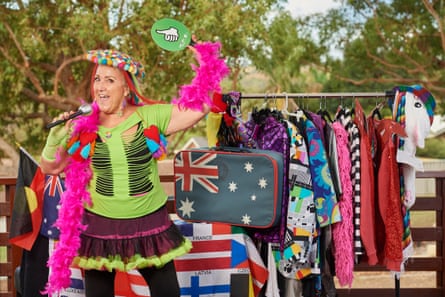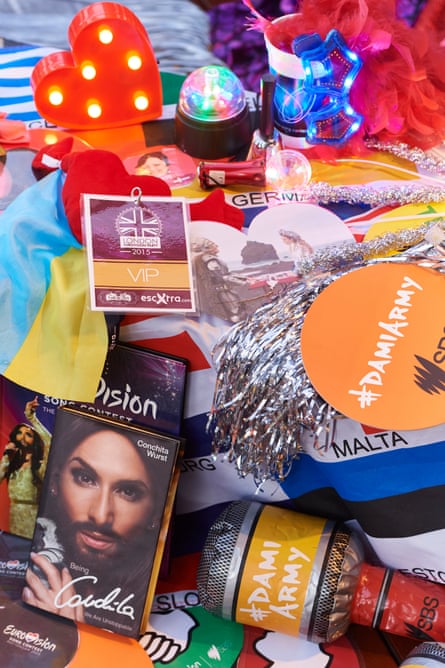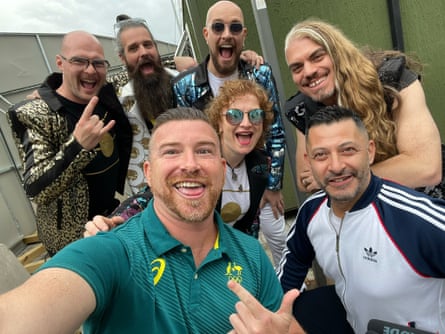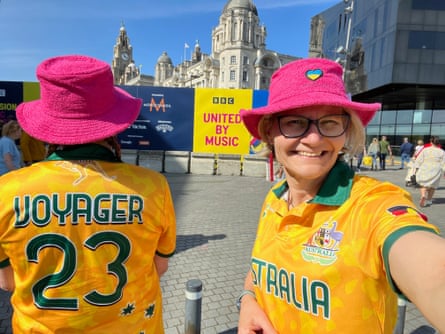The UK is having one of its busiest weeks in months – but while the coronation put Britain in the global spotlight last weekend, all eyes are on a very different cultural spectacle in Liverpool this weekend.
Eurovision drew in 161 million viewers last year, with 40 countries participating. Since 1956, each has put forward a musical act to face a public vote – and for millions of die-hard fans, the winners are the real royalty.
Some of those fans are in Australia, where it was watched by 2.7 million last year. The country was first invited in 2015, but its entry is only guaranteed until this year. This means that when Perth synth-metal band Voyager competes in the second semi-final (first broadcast on SBS at 5am Friday AEST, thanks to the time difference), it could be the last time we see an Australian entrant on the main stage.
Deb Shaw, 51, from Adelaide, will certainly be watching – she’s currently in Liverpool, her first time watching in person.
“Eurovision is life to me,” she says. Usually, Shaw hosts an annual get-together with her friends, which involves their own scoring system and to-scale replica flags of every country participating. Like others who host Eurovision parties, there’s a smorgasbord of costumes – and food from each year’s host country.
“I love the spectacle … It’s like our Christmas,” she says. “Christmas isn’t always a happy time for lots of people, but Eurovision is always happy.”
Shaw’s parties are dwarfed by Kate Hansen’s efforts. The 70-year-old has been following the competition since 1971, and has even attended twice – and for the past 10 years has been hosting her own ticketed “EuroClub” Eurovision-themed events in Perth. There are competitions and prizes for the best dressed, and this year 50 people will attend the sold-out grand final screening – with some travelling from cities on the east coast to be there.
The public events are a natural extension of her personal fandom. Hansen makes a different outfit each year and has collected seven crates of Eurovision memorabilia, including costumes, programs, decorations “and lots of wigs and feather boas!”

“We can be crazy, we can dress up, we can be ourselves … It’s about more than the music,” she says. “I’ve gained a community of friends that I wouldn’t live without, some have become almost family.”
The Australian branch of Organisation Générale des Amateurs de l’Eurovision (OGAE), the world’s largest Eurovision fan club, has around 800 members. This puts it ahead of equivalent branches in France, Italy, Ireland and Sweden, countries traditionally considered Eurovision stalwarts. Members pay an annual $25 fee which gives them access to social events throughout the year, including a worldwide OGAE song contest which members can compete in, and priority access to Eurovision tickets.
So committed are Australian fans to the cause that the BBC mistook one OGAE Australia member, wearing a custom-made costume, for Finland’s entrant Käärijä and ran an interview with them in Liverpool on Tuesday night.
But why are Australians so enamoured by a competition that they didn’t even compete in until recently?

“We’re a nation of immigrants, a lot of us come from Europe in the first instance,” says Paul Clarke, the creative director of Australia’s Eurovision delegation. He says for many Australians, Eurovision is a chance to celebrate their heritage and hear songs in their own language.
Clarke helped broker Australia’s entry into the contest in 2015, but first attended when he produced the Australian commentary for Moscow 2009. “It was such a great atmosphere, I just fell in love with it and thought, ‘We’ve got to be part of this’,” he recalls.
Ruth Oldfield, 57, from Canberra, has been watching since the 1990s and believes it’s the values that Eurovision promotes that resonate with fans. She says it’s helped nurture her children’s appreciation of cultures outside of their own.
“It’s adapted to the changing climate of Europe and changing society, welcoming many new countries. It’s obviously been hugely influential in the LGBTQ+ community and shown an often conservative audience that gender diversity is nothing to be afraid of,” she says.
But with this year’s contest taking place in Liverpool, historically high airfares and food prices in the UK rising at the fastest rate in 45 years, attending, for Australians, is not cheap.
after newsletter promotion
Dale Roberts, 41, and Mike Jones, 50, have travelled from Brisbane to Liverpool for the contest and estimate they have spent $15,000 on flights, accommodation and other costs. “And that’s before we’ve had a pint,” says Jones.

They host the AussieVision podcast, providing weekly updates about the contest from November until May each year. They started the podcast at their own expense, but production costs are now covered via listener donations.
The personal cost of their fandom has been even more taxing, with weekends spent watching and reviewing countries’ entries, updating their website and recording the podcast – even when on holiday. “It takes up every weekend … Our friends and families know that we’re not really reachable for six months of the year,” says Roberts.
Not everyone can afford to go. Brett Davies, 45, a teacher and longtime Eurovision fan from New South Wales, has long been trying to get his students interested in Eurovision. This year, he registered a small triumph: his school’s recess bell will be replaced by Eurovision anthems all week.
In Sydney’s Hurstville, the Georges River Council is hosting what it calls “Australia’s largest Eurovision party” – starting at 4am. Perhaps a strange move for a local council? “Sixty-six percent of our residents have ancestral ties to one of the countries in the contest,” explains Leo Chant, the council’s business improvement officer. “Eurovision really aligns with [our community’s] values of diversity and inclusion and is entirely multicultural, so it’s the perfect way to celebrate.”
Perth band Voyager have been vying to represent the country since Australia started competing. Their competing song Promise is a solid, rousing track, which Aussie fans are hopeful will make it through the second semi-final to compete in the grand final on Saturday.
No announcement has been made about whether Australia will be invited back to Eurovision beyond this year, but Clarke is hopeful. Sure, it’s not part of Europe, but many other competing countries are on the periphery anyway. The competition, he says, shouldn’t be limited by geography.
“Australia has contributed a lot to the competition,” Clarke says. One particular legacy, he thinks, is that the UK has started taking its entries more seriously after finishing in last place five times in the past 20 years.
And even if Australia doesn’t compete next year, Aussie fans won’t be perturbed.
“Australians are into Eurovision because we don’t take ourselves too seriously,” Oldfield says. “We love a party, we’re unashamed, unafraid and open-armed: we get it, it’s about having fun!”
-
The second Eurovision semi-final, featuring Voyager, will be broadcast on SBS from 5am AEST Friday 12 May, and repeated Saturday 13 May at 7.30pm AEST. The Eurovision grand final is broadcast on SBS from 5am AEST Sunday 14 May and repeated at 7.30pm AEST the same day

